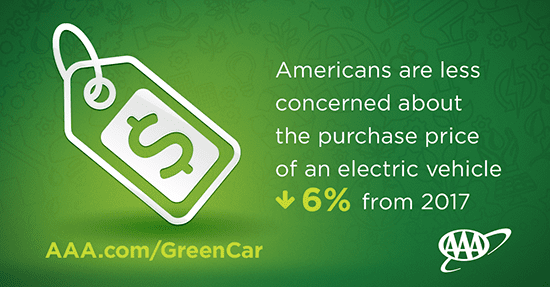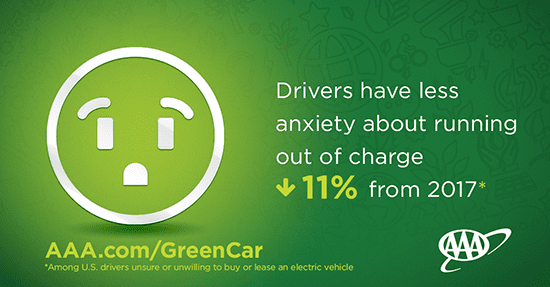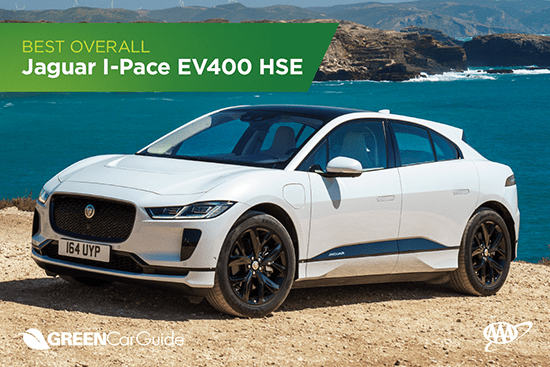Concerns about vehicle range, number of charging stations are starting to subside
BOISE – (May 9, 2019) – Although most Americans are still hesitant to purchase an electric vehicle, softening attitudes could lead to greater adoption of the technology in the future, says AAA.
For the past few years, AAA has studied consumer attitudes toward electric and alternative fuel vehicles. This year, consumer interest is unchanged from 2018, with just 16 percent of Americans reporting that they are likely to buy an electric car the next time they are in the market for a new or used vehicle. Major motivations for doing so would be concern for the environment (74 percent) and lower long-term costs (56 percent).
At the same time, some major concerns surrounding electric vehicles are beginning to subside. According to AAA’s research, the percentage of drivers who have anxiety about running out of charge has dropped 11 percent since 2017. Over the same period, public discomfort with the vehicle purchase price decreased by six percent.


“There’s a lot of confusion about vehicle technology in general,” says AAA Idaho spokesman Matthew Conde. “For example, when people were asked if most cars would be electric by the year 2029, only 40 percent said yes. But in a separate survey, more than half said that they believe most cars will be self-driving by then – a scenario that’s far less likely to happen. In coming years, it will be important for organizations like AAA to help separate science fact from science fiction.”
AAA encourages motorists to gather information and ask plenty of questions before making a purchase decision. Electrics, hybrids, and other alternative fuel vehicles are available in a wide variety of sizes and performance options. The good news – most electric vehicle owners will never face range anxiety, because the battery can recharge overnight at home. A list of public charging stations, including for longer road trips, can be found in the AAA mobile app.
Potential electric vehicle owners may not know that electric vehicles outperform their gas-powered counterparts in stop and go traffic, and that electrics and hybrids purchased during or after 2010 may also be eligible for a federal tax credit ranging from $2,500 to $7,500, which could alleviate some worries about price.
Electric vehicle owners need to understand the effects of using the HVAC system during extremely hot or cold weather. Based on previous AAA research, drivers who use the A/C when the temperature spikes above 95 degrees, or who use the heat when the temperature drops below 20 degrees, can expect a substantial impact on their vehicle range that should be planned for ahead of time.
In AAA’s latest survey, 40 percent of the drivers who are unlikely or unsure about buying an electric vehicle said that fuel would need to cost at least $5 per gallon or more to motivate them to switch.
“AAA provides all of this data, including the results of lab and real-world testing, in order to arm the motoring public with the ability to make informed decisions,” Conde said. “An electric vehicle may not be the right answer for every Idahoan, particularly in rural parts of our state. But commuters in urban settings should look into the potential benefits, including the reviews and ratings for specific vehicles, to see if one would meet their particular needs.”
2019 AAA Green Car Guide
AAA tested 77 vehicles in 13 different categories to compile results for the annual AAA Green Car Guide. This year, the winner for best overall vehicle was the Jaguar I-Pace EV400 HSE.

For a complete list of vehicles, including winners for each category and a detailed breakdown of the parameters for a “green” vehicle, visit AAA.com/greencar.

